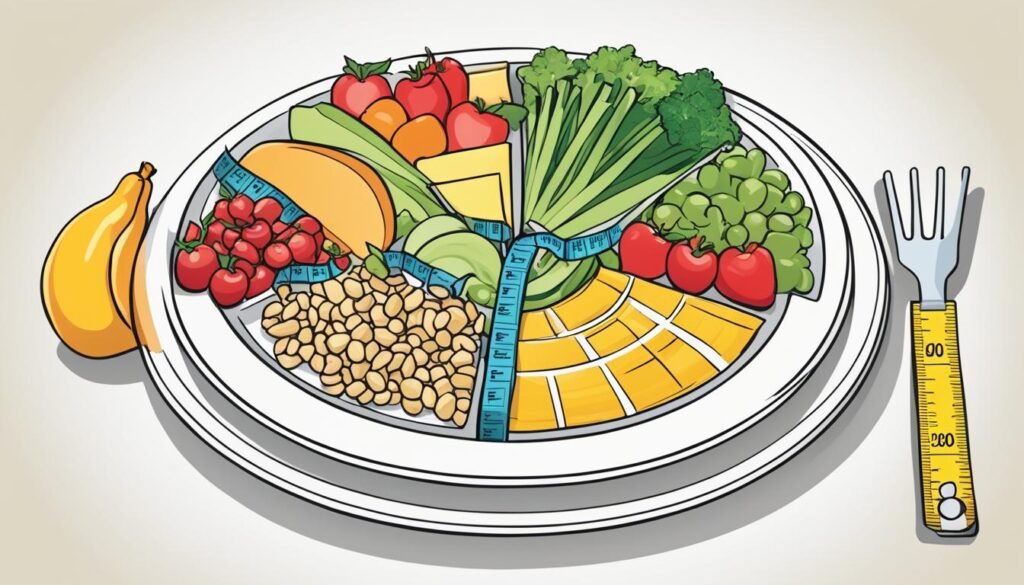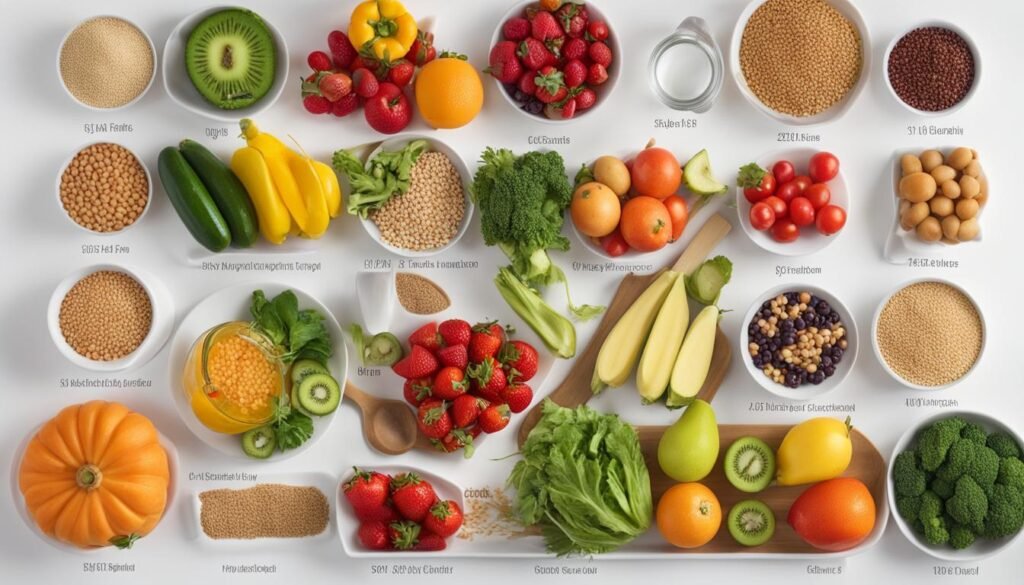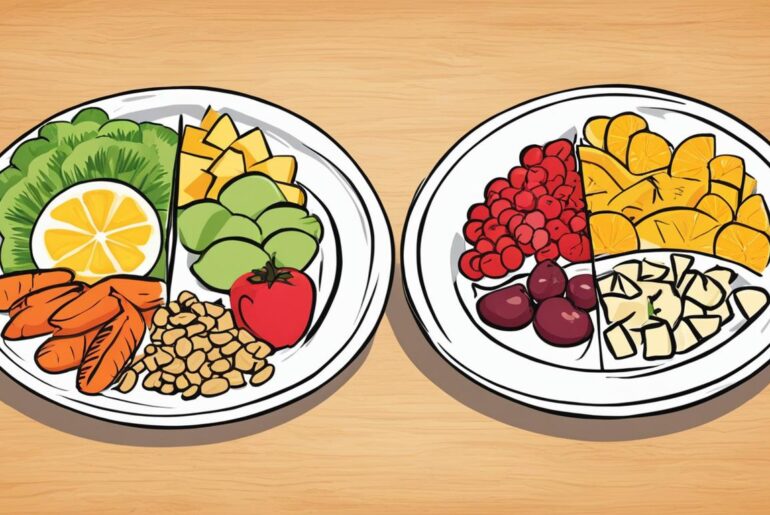I am often asked about effective diet plans and weight loss tips. One popular approach is the 1200-calorie diet, which promises rapid weight loss by creating a calorie deficit. But how much weight can you actually lose in a week on this diet? Let’s explore the details.
A 1200-calorie diet involves consuming significantly fewer calories than the average person needs to maintain their weight, which is typically between 1600 and 2400 calories per day. By creating this calorie deficit, the body turns to its stored fat for energy, resulting in weight loss.
However, it’s important to approach weight loss in a healthy and sustainable way. While a 1200-calorie diet can lead to significant weight loss, it may also come with potential drawbacks such as nutrient deficiencies and a slower metabolism.
Before embarking on any weight loss journey, it is essential to consider your individual needs and consult with a healthcare professional or registered dietitian. They can help customize a plan that aligns with your goals while ensuring you still receive the necessary nutrients for optimal health.
To achieve long-term, safe, and sustainable weight loss, it’s important to focus on healthy eating and lifestyle habits rather than relying solely on a restrictive calorie intake. Consistency, mindful eating, and regular physical activity play crucial roles in maintaining a healthy weight.
Key Takeaways:
- A 1200-calorie diet can result in significant weight loss by creating a calorie deficit.
- It’s important to approach weight loss in a healthy and sustainable way.
- Consult with a healthcare professional or registered dietitian before starting any weight loss plan.
- Consistency, mindful eating, and regular physical activity are key for long-term weight management.
- Weight loss should prioritize overall health and well-being.
What is a 1,200-calorie meal plan?
A 1,200-calorie meal plan is a low-calorie diet designed for weight loss. With this meal plan, the goal is to consume no more than 1,200 calories per day, creating a calorie deficit that can contribute to shedding unwanted pounds. The plan typically includes a balance of protein, carbohydrates, and fats, focusing on nutrient-dense foods that provide essential vitamins and minerals.
This low-calorie diet requires careful meal planning to ensure adequate nutrition while staying within the calorie limit. It is essential to include a diverse range of nutrient-dense foods to meet the body’s needs, such as lean proteins, whole grains, fruits, vegetables, and healthy fats. These nutrient-dense foods provide the necessary vitamins, minerals, and antioxidants to support overall health and well-being while promoting weight loss.
However, it’s important to note that the 1,200-calorie meal plan may lack the flexibility to accommodate foods that are low in nutrition or higher in calorie content. Designing a meal plan that meets your nutritional needs while staying within the calorie limit requires careful consideration and meal preparation.
Benefits of a 1,200-calorie meal plan

Following a well-planned 1,200-calorie meal plan can have numerous benefits for weight loss, metabolic health, blood-sugar management, and overall health improvement.
Weight Loss
A 1,200-calorie meal plan provides a calorie deficit which can lead to significant weight loss. Research has shown that individuals who followed this type of diet for a year achieved an average weight loss of about 32 pounds.
Metabolic Health
A 1,200-calorie meal plan can improve metabolic health by reducing body weight and fat mass. This can have positive effects on metabolic markers such as cholesterol levels and blood glucose. In particular, individuals with pre-diabetes or type 2 diabetes may experience significant improvements in blood sugar management.
Health Improvement
By following a well-balanced 1,200-calorie meal plan, individuals can improve their overall health and well-being. This type of diet encourages the consumption of nutrient-dense foods, which provide essential vitamins, minerals, and antioxidants. It also promotes portion control and mindful eating habits, which can lead to better dietary choices and long-term health improvements.
Overall, a properly designed 1,200-calorie meal plan can be an effective tool for weight loss and improving metabolic health. However, it is important to seek guidance from a registered dietitian or healthcare professional to ensure that the meal plan meets individual nutritional needs and is sustainable in the long term.
Downsides of a 1,200-calorie meal plan
While a 1,200-calorie meal plan may offer weight loss benefits, it also comes with certain downsides to consider. These include the potential for weight regain, nutrient deficiencies, a slower metabolism, and challenges with long-term sustainability.
The risk of weight regain
Research has shown that individuals who successfully lose weight through a low-calorie diet, such as a 1,200-calorie meal plan, often experience weight regain over time. In fact, studies have found that people who lose 10% of their body weight through a low-calorie diet tend to regain about half of the weight within nine months. This can be frustrating for those striving to maintain their weight loss in the long term.
Nutrient deficiencies
Due to the restricted nature of a 1,200-calorie meal plan, achieving adequate nutrient intake can be challenging. The limited calorie allowance may not provide sufficient amounts of essential vitamins, minerals, and macronutrients, leading to nutrient deficiencies. This can negatively impact overall health and well-being in the long run.
Slower metabolism
Following a prolonged low-calorie diet, like a 1,200-calorie meal plan, can potentially slow down the metabolism. The body adapts to the reduced calorie intake by conserving energy, which can result in a slower metabolism. A slower metabolism makes it more difficult to continue losing weight or maintain weight loss in the future.
Long-term sustainability
While a 1,200-calorie meal plan can yield short-term weight loss results, it may not be sustainable in the long run. The restrictive nature of this type of diet can make it challenging to maintain and may result in feelings of deprivation. Long-term adherence to such a low-calorie plan can be difficult, diminishing its effectiveness and leading to potential weight regain.
It’s important to note that following a 1,200-calorie meal plan should be done under the guidance of a healthcare professional or registered dietitian. They can help mitigate potential risks and provide personalized advice to ensure a balanced approach to weight loss.
“While a 1,200-calorie meal plan can lead to initial weight loss, it’s essential to be aware of the potential downsides and seek professional guidance to ensure a balanced and sustainable approach to weight management.”
How much weight can you lose with a 1,200-calorie meal plan?

The amount of weight you can lose with a 1,200-calorie meal plan depends on various factors, including your starting weight and activity level. When following a 1,200-calorie meal plan, the aim is to create a calorie deficit, where you consume fewer calories than your body needs to maintain its weight.
Generally, a calorie deficit of 500 to 1,000 calories per day can lead to a safe and sustainable weight loss of 1 to 2 pounds per week. This means that you would consume approximately 700 to 1,200 calories per day on a 1,200-calorie meal plan.
However, it’s important to note that individual results may vary. Factors such as metabolism, hormone levels, and overall health can influence how your body responds to a calorie deficit. Consulting with a healthcare professional or registered dietitian before starting any weight loss plan is recommended to ensure it is appropriate for your individual needs.
Note on individual factors:
It’s important to consider your individual factors that can affect weight loss. Some individuals may have a higher metabolic rate or may naturally burn more calories than others, making weight loss easier. Others may have slower metabolisms or medical conditions that can impact their ability to lose weight.
Additionally, starting weight plays a role. People who have a higher starting weight may experience more significant weight loss initially, while those who are already closer to a healthy weight may lose weight at a slower rate.
Finally, physical activity level is another important factor to consider. Regular exercise can help boost weight loss by burning more calories and increasing the calorie deficit.
To maximize your weight loss potential with a 1,200-calorie meal plan, it’s important to focus on overall healthy habits, including regular exercise, adequate sleep, stress management, and consuming nutrient-dense foods within those calorie limits.
Factors Influencing Weight Loss on a 1,200-Calorie Meal Plan
| Factors | Description |
|---|---|
| Starting weight | The higher the starting weight, the potential for more significant weight loss initially. |
| Metabolic rate | Individual variations in metabolic rate can impact the rate of weight loss. |
| Physical activity | Regular exercise increases calorie burn and can optimize weight loss. |
| Hormonal factors | Hormonal imbalances or medical conditions can influence weight loss. |
Remember, sustainable weight loss is a gradual process that requires long-term commitment and lifestyle changes. It’s important to focus on overall health and well-being rather than solely focusing on the number on the scale.
Image displaying a person holding a plate with healthy food, representing weight loss with a 1,200-calorie meal plan.
Sample 1,200-Calorie Meal Plan for 7 Days
Looking for a 1,200-calorie meal plan to kickstart your weight loss journey? Here is a sample menu to help you get started. Remember to adjust portion sizes and food choices based on your personal preferences and dietary restrictions.
| Day | Breakfast | Lunch | Dinner | Snack |
|---|---|---|---|---|
| Day 1 | Whole-wheat English muffin with ricotta cheese and tomato | Tuna with avocado and cucumbers | Baked chicken with red potatoes and a side salad | Greek yogurt with strawberries |
| Day 2 | Toasted waffle topped with Greek yogurt, berries, and nuts | Salad with rotisserie chicken, avocado, and feta cheese | Marinated chicken with brown rice and peas | Pear with nuts |
| Day 3 | Rolled oats with berries and Greek yogurt | Pita stuffed with salmon, lettuce, and tomato | Chicken stir-fry with bell peppers and onions over brown rice | Cottage cheese with an orange |
| Day 4 | Cottage cheese with cantaloupe and toast with nut butter | Deconstructed sushi bowl | Sweet potato rounds with turkey and zucchini | Green olives |
This meal plan provides a variety of nutrient-dense foods to support your weight loss goals. Remember to include a combination of lean protein, healthy carbohydrates, and colorful fruits and vegetables in your meals. It’s also essential to stay hydrated throughout the day by drinking water or herbal tea.
Keep in mind that this sample meal plan is just one example, and you can customize it to suit your tastes and food preferences. Additionally, it’s always a good idea to consult with a healthcare professional or registered dietitian before making any significant changes to your diet.
Calculating Daily Calorie Goal for Weight Loss

To successfully lose weight, it is important to determine your daily calorie goal. This goal serves as a starting point for creating a calorie deficit, which is essential for weight loss. Calculating your daily calorie goal is simple: multiply your current weight by 12.
For example, if your current weight is 160 pounds, your daily calorie goal for weight loss would be approximately 1,920 calories (160 x 12 = 1,920). This estimate provides a general guideline for creating a calorie deficit and initiating weight loss.
In general, to lose 1 pound per week, you should aim to consume 500 calories less than your daily calorie goal. For example, if your daily calorie goal is 1,920 calories, you would need to reduce your daily calorie intake to 1,420 calories (1,920 – 500 = 1,420).
It’s important to note that individual calorie needs may vary based on factors such as age, gender, activity level, and metabolism. Consulting with a healthcare professional or registered dietitian can provide personalized guidance in determining your specific daily calorie goal for weight loss.
Remember, creating a calorie deficit through proper diet and exercise is essential for weight loss. However, it’s important to strike a balance and avoid excessively restricting calorie intake, as it can lead to nutrient deficiencies and other health risks. Always prioritize your overall well-being and consult with professionals for personalized advice and support.
Exercise and Calorie Restriction for Weight Loss

Incorporating exercise into your weight loss journey can greatly enhance the effectiveness of a 1,200-calorie meal plan. Physical activity not only burns additional calories but also contributes to an increased calorie deficit, accelerating weight loss results.
By combining exercise with calorie restriction, sustainable weight loss becomes more achievable. Exercise helps to build lean muscle mass, which increases your metabolism and allows you to burn more calories even at rest. It also improves cardiovascular health, boosts mood, and increases energy levels.
When choosing exercise activities, opt for ones that you enjoy and can maintain in the long term. This will help you stay motivated and make physical activity a regular part of your lifestyle. Whether it’s walking, jogging, cycling, swimming, or participating in group fitness classes, find activities that fit your preferences and schedule.
Remember, maintaining a healthy weight involves not only losing weight but also keeping it off. Regular exercise, combined with calorie restriction, can help you achieve sustainable weight loss and maintain your desired weight in the long run.
The Benefits of Exercise for Weight Loss:
- Increased calorie burn, aiding in weight loss
- Improvement in cardiovascular health and overall fitness
- Enhanced mood and reduced stress levels
- Increased muscle tone and strength
- Improved metabolism, allowing for continued calorie burning
Regular exercise not only helps you lose weight but also improves your overall health and well-being.
Tips for Incorporating Exercise into Your Weight Loss Journey:
- Schedule exercise sessions and treat them as non-negotiable appointments.
- Start with activities that are enjoyable and gradually increase intensity and duration over time.
- Find a workout buddy or join fitness classes to stay motivated and accountable.
- Mix up your routines to prevent boredom and keep your body challenged.
- Consider seeking professional guidance from a personal trainer or fitness expert to ensure proper form and effective workouts.
Importance of Nutrient Intake on a 1,200-Calorie Meal Plan

While following a 1,200-calorie meal plan can lead to weight loss, it is crucial to prioritize nutrient intake to maintain a balanced diet and support overall well-being. Consuming a variety of nutrient-dense foods is essential to meet the body’s micronutrient and macronutrient needs.
When designing a 1,200-calorie meal plan, it is important to include sources of protein, carbohydrates, and healthy fats, along with an array of vitamins and minerals. These nutrients play vital roles in keeping the body functioning optimally and promoting good health.
Macronutrients in a 1,200-Calorie Meal Plan
Macronutrients are the primary nutrients needed in larger quantities to provide energy and support other essential bodily functions. They include carbohydrates, proteins, and fats.
- Carbohydrates: Choose nutrient-rich, complex carbohydrates such as whole grains, fruits, and vegetables. They provide energy, fiber, and essential vitamins and minerals.
- Proteins: Incorporate lean sources of protein like poultry, fish, legumes, and tofu. Protein is necessary for the repair and growth of body tissues, as well as the production of enzymes and hormones.
- Fats: Opt for healthy fats like avocados, nuts, seeds, and olive oil. These provide essential fatty acids and fat-soluble vitamins.
Micronutrients in a 1,200-Calorie Meal Plan
Micronutrients are essential nutrients required in smaller amounts, but they play vital roles in maintaining overall health. They include vitamins and minerals.
| Essential Micronutrients | Sources |
|---|---|
| Vitamin A | Carrots, sweet potatoes, spinach, kale |
| Vitamin C | Citrus fruits, strawberries, bell peppers, broccoli |
| Vitamin D | Fatty fish, fortified dairy products, sunlight exposure |
| Calcium | Dairy products, leafy greens, tofu |
| Iron | Red meat, beans, lentils, spinach |
| Omega-3 fatty acids | Fatty fish, chia seeds, flaxseeds, walnuts |
It is important to work with a registered dietitian to create a well-rounded meal plan that ensures adequate nutrient intake within the 1,200-calorie limit. Consulting with a professional can help address individual nutritional needs and prevent nutrient deficiencies.
Long-term Sustainability and Weight Maintenance
Long-term weight loss and maintenance can be challenging, especially after following a 1,200-calorie meal plan. To achieve sustainable weight loss and maintain a healthy weight, it’s essential to focus on building healthy habits and making permanent lifestyle changes.
Behavior Change:
Successful long-term weight loss requires a shift in behavior. Instead of relying solely on temporary diets, it’s important to adopt sustainable habits that promote a healthy lifestyle. This can include practicing mindful eating, listening to hunger cues, and being aware of emotional triggers that lead to overeating.
Regular Exercise:
Physical activity plays a crucial role in maintaining weight loss (check this post out). Incorporating regular exercise into your routine helps burn calories, build muscle, and boost metabolism. Aim for a combination of cardiovascular exercises, strength training, and flexibility exercises to maximize weight loss efforts.
Portion Control:
Practicing portion control is key for weight maintenance. Be mindful of serving sizes and avoid overeating. Use smaller plates, measure food portions, and be conscious of calorie-dense foods that may easily contribute to weight gain.
Balance:
Finding a balance between nutrient-dense foods and occasional treats is essential for long-term weight maintenance. Restrictive diets can be difficult to sustain, so allow yourself flexibility and enjoyment in your eating plan. Aim for a varied and balanced diet that includes fruits, vegetables, lean proteins, whole grains, and healthy fats.
Behavioral and Emotional Support:
Seeking behavioral and emotional support can greatly benefit weight maintenance efforts. Consider joining a support group, working with a registered dietitian, or seeking guidance from a weight loss coach. These professionals can provide accountability, guidance, and encouragement throughout your journey.
By incorporating sustainable habits, such as regular exercise, portion control, and a balanced diet, you can achieve long-term weight loss and effectively maintain a healthy weight.
Potential risks and considerations
When embarking on a 1,200-calorie meal plan, it’s essential to be aware of the potential risks and considerations associated with a low-calorie diet. Severely restricting calorie intake can have implications for your health and well-being, including the risk of nutrient deficiencies and metabolic changes.
A low-calorie diet may not provide sufficient essential nutrients, such as vitamins, minerals, and macronutrients, needed for optimal health. This can lead to nutrient deficiencies and compromise your overall well-being. It’s important to ensure that your 1,200-calorie meal plan includes a variety of nutrient-dense foods to help meet your body’s nutritional needs.
Severely restricting calorie intake can lead to nutrient deficiencies, metabolic changes, and negative impacts on overall well-being.
Additionally, a low-calorie diet can cause metabolic changes in your body. As your calorie intake decreases, your metabolism may slow down to conserve energy. This can make it more challenging to continue losing weight as your body adapts to the reduced calorie intake.
Monitoring your physical and mental well-being is crucial while following any weight loss plan, including a 1,200-calorie meal plan. If you experience any adverse effects, such as extreme fatigue, dizziness, hair loss, or mood changes, it’s important to consult with a healthcare professional. Individual needs and health conditions should be taken into consideration before starting a low-calorie diet.
Achieving and maintaining a healthy weight involves more than just following a 1,200-calorie meal plan. It also requires making sustainable lifestyle changes, incorporating regular physical activity, and focusing on overall well-being. Prioritizing your health and seeking guidance from healthcare professionals or registered dietitians can help ensure that any weight loss plan is safe and tailored to your individual needs.
Conclusion
In conclusion, a 1,200-calorie meal plan can be a helpful tool for short-term weight loss. By creating a calorie deficit, it can lead to significant weight loss results. However, it’s important to approach this type of diet with caution and prioritize long-term sustainable habits.
Healthy weight loss is not just about the number on the scale, but also about overall well-being. It’s crucial to focus on a balanced diet that includes a variety of nutrient-dense foods, adequate protein, carbohydrates, and healthy fats. Incorporating regular exercise can enhance the effectiveness of a 1,200-calorie meal plan and support long-term weight maintenance.
Consulting with a healthcare professional or registered dietitian is highly recommended before starting any weight loss journey. They can provide personalized guidance, help create a well-rounded meal plan, and ensure that you are meeting all your nutritional needs. Remember, sustainable habits are key to achieving and maintaining a healthy weight in the long run.
FAQ
What is a 1,200-calorie meal plan?
A 1,200-calorie meal plan is a low-calorie diet where the aim is to consume no more than 1,200 calories per day. This type of diet is designed to help individuals achieve weight loss by creating a calorie deficit. It typically includes a balance of protein, carbohydrates, and fats, and focuses on consuming nutrient-dense foods.
What are the benefits of a 1,200-calorie meal plan?
Following a well-planned 1,200-calorie meal plan can lead to weight loss and improvement in metabolic health. Research has shown that individuals who followed this type of diet for a year achieved an average weight loss of about 32 pounds. Additionally, measures of cholesterol levels and blood glucose improved, particularly in people with pre-diabetes or type 2 diabetes.
What are the downsides of a 1,200-calorie meal plan?
One of the main downsides of a 1,200-calorie meal plan is the potential for weight regain. Studies have shown that individuals who lost 10% of their body weight through a low-calorie diet often regained about half of the weight within nine months. This type of diet can also lead to nutrient deficiencies and a slower metabolism, making it harder to maintain weight loss in the long term.
How much weight can you lose with a 1,200-calorie meal plan?
The amount of weight you can lose with a 1,200-calorie meal plan depends on various factors, including your starting weight and activity level. Generally, a calorie deficit of 500 to 1,000 calories per day can lead to a safe and sustainable weight loss of 1 to 2 pounds per week. However, individual results may vary.
Can you provide a sample 1,200-calorie meal plan for 7 days?
Certainly! Here’s a sample 1,200-calorie meal plan for a week:
– Day 1: Whole-wheat English muffin with ricotta cheese and tomato for breakfast, tuna with avocado and cucumbers for lunch, baked chicken with red potatoes and a side salad for dinner, and Greek yogurt with strawberries for a snack.
– Day 2: Toasted waffle topped with Greek yogurt, berries, and nuts for breakfast, salad with rotisserie chicken, avocado, and feta cheese for lunch, marinated chicken with brown rice and peas for dinner, and a pear with nuts for a snack.
– Day 3: Rolled oats with berries and Greek yogurt for breakfast, pita stuffed with salmon, lettuce, and tomato for lunch, chicken stir-fry with bell peppers and onions over brown rice for dinner, and cottage cheese with an orange for a snack.
– Day 4: Cottage cheese with cantaloupe and toast with nut butter for breakfast, deconstructed sushi bowl for lunch, sweet potato rounds with turkey and zucchini for dinner, and green olives for a snack.
How do I calculate my daily calorie goal for weight loss?
To calculate your daily calorie goal for weight loss, you can start by multiplying your current weight by 12. This estimate provides a starting point for creating a calorie deficit. For example, if your current weight is 160 pounds, your daily calorie goal for weight loss would be approximately 1,920 calories. To lose 1 pound per week, you would need to reduce your daily calorie intake by 500 calories.
Is exercise important while following a 1,200-calorie meal plan?
Yes, incorporating exercise into your weight loss journey can enhance the effectiveness of a 1,200-calorie meal plan. Physical activity helps burn additional calories and can contribute to an increased calorie deficit. When combined with calorie restriction, exercise can help achieve sustainable weight loss. It is important to find activities that you enjoy and can maintain in the long term to support your weight loss goals.
What is the importance of nutrient intake on a 1,200-calorie meal plan?
While a 1,200-calorie meal plan can lead to weight loss, it’s crucial to ensure adequate nutrient intake. This includes consuming a variety of nutrient-dense foods to meet the body’s micronutrient and macronutrient needs. A balanced diet should include sources of protein, carbohydrates, healthy fats, vitamins, and minerals. It may be necessary to work with a registered dietitian to create a well-rounded meal plan that meets all nutritional requirements.
How can I sustain long-term weight loss and maintenance?
Long-term weight loss and maintenance can be challenging, especially after following a 1,200-calorie meal plan. To sustain weight loss, it’s important to focus on building healthy habits and making permanent lifestyle changes. This may include incorporating regular exercise, practicing portion control, and finding a balance between nutrient-dense foods and occasional treats. Behavioral and emotional support can also be helpful in maintaining weight loss.
What are the potential risks and considerations of a 1,200-calorie meal plan?
It’s important to consider the potential risks of following a 1,200-calorie meal plan. Severely restricting calorie intake can lead to nutrient deficiencies, metabolic changes, and negative impacts on overall well-being. It’s crucial to monitor your physical and mental health while on any weight loss plan and consult with a healthcare professional if you experience any adverse effects. Individual needs and health conditions should be taken into account before starting a low-calorie diet.
Source Links
- https://www.today.com/health/1200-calorie-diet-meal-plan-can-it-help-weight-loss-t189954
- https://www.eatingwell.com/article/136578/what-does-a-1200-calorie-diet-look-like/
- https://www.livestrong.com/article/439968-how-much-weight-can-you-lose-a-week-on-a-1200-calorie-diet/




